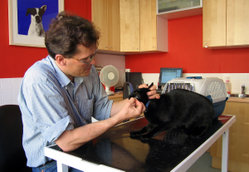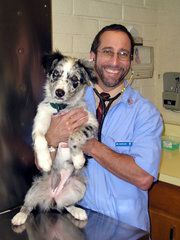 A veterinary surgeon removes stitches from a cat's face following minor
surgery on an abcess.
A veterinary surgeon removes stitches from a cat's face following minor
surgery on an abcess.
|
From Wikipedia the free encyclopedia, by MultiMedia |
 A veterinary surgeon removes stitches from a cat's face following minor
surgery on an abcess.
A veterinary surgeon removes stitches from a cat's face following minor
surgery on an abcess.
In American and Canadian English, a veterinarian (from Latin veterinae, "draught animals") is an animal doctor, a practitioner of veterinary medicine. The equivalent term in British English is veterinary surgeon, and both terms are often shortened to vet. The word veterinarian was first used in English by the doctor Sir Thomas Browne (16051682).
Perhaps the most popular depiction of this kind of doctor at work is in the autobiographical books by James Herriot and the television adaptation, All Creatures Great and Small.Overview
While a veterinarian does hold a doctoral degree in veterinary medicine (in the United States and Canada, at least), not all veterinarians enter clinical practice. Those that do still have a wide range of options: companion animal or "pet" medicine (Dogs, cats, rabbits, ferrets, etc), "exotic" animal medicine (various rodents, sugar gliders, possums, hedgehogs, reptiles), reptile medicine, ratite medicine, livestock medicine, equine medicine (sports or race track or show or rodeo, etc.), or laboratory animal medicine, to name a few. Those who do not may enter a research field, studying an area of medical, veterinary medical, or pharmacological research. Research veterinarians were the first to isolate oncoviruses, Salmonella species, Brucella species, and various other pathogenic agents. They also helped conquer malaria and yellow fever, solved the mystery of botulism, produced an anticoagulant used to treat some people with heart disease, and defined and developed surgical techniques for humans, such as hip-joint replacement and limb and organ transplants.
Like all physicians, veterinarians must make ethical judgments, such as whether or not to perform debarking procedures. There is also ongoing discussion over the ethics of performing procedures such as declawing cats and cropping the ears of Dogs. In some countries, these procedures are illegal.
Some veterinarians work in a field called regulatory medicine ensuring the nation's food safety by working with the USDA FSIS, or protecting us from imported exotic animal diseases by working for the USDA APHIS. The emerging field of conservation medicine involves veterinarians even more directly with human health care, providing a multidisciplinary approach to medical research that also involves environmental scientists.
More than 3800 veterinarians in the USA currently work at veterinary schools, teaching student vets what they need to know to graduate so teaching is another career path.
 A good veterinarian enjoys working with animals and their owners.
A good veterinarian enjoys working with animals and their owners.
Admission into veterinary medical school is competitive. According to the US Department of Labor, 1 in 3 applicants was accepted into a veterinary program in 2002. Prerequisites for admission include the undergraduate studies listed under veterinary medicine and extensive veterinary experience (typically about 500 or more hours) in private practice or other veterinary environment. The average veterinary medical student has an undergraduate GPA of 3.5 and a GRE score of approximately 1800.
There is some reciprocal international recognition of veterinary degrees. For example veterinarians with degrees from the UK or New Zealand are immediately allowed to practice in Australia whereas vets with degrees from other countries are usually required to pass a set of qualifying exams before being allowed to practice. Australia currently has 5 Universities offering veterinary degrees - University of Sydney, Murdoch University, Melbourne University, University of Queensland, and Charles Sturt University. A sixth University is preparing for its first intake of vet students at the end of 2005 - James Cook University
Public health medicine is another option for veterinarians. Veterinarians in government and private laboratories provide diagnostic and testing services. Some veterinarians serve as state epidemiologists, directors of environmental health, and directors of state or city public health departments. Veterinarians are also employed by the US Agriculture Research Service, Fish and Wildlife Service, Environmental Protection Agency, National Library of Medicine, and National Institutes of Health. The military also employs veterinarians in a number of capacities caring for pets on military bases, caring for military working animals, and controlling various arthropod-borne diseases or other such things.
Dogs, made by MultiMedia | Free content and software
This guide is licensed under the GNU Free Documentation License. It uses material from the Wikipedia.